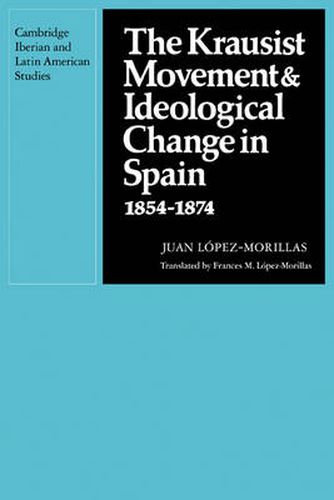Readings Newsletter
Become a Readings Member to make your shopping experience even easier.
Sign in or sign up for free!
You’re not far away from qualifying for FREE standard shipping within Australia
You’ve qualified for FREE standard shipping within Australia
The cart is loading…






This is a definitive study of a major intellectual movement of nineteenth-century Spain. The ‘harmonic rationalism’ of the German Karl Christian Friedrich Krause (1781-1832), a philosophy dedicated to an ideal of universal brotherhood, had an unexpectedly powerful influence upon Spanish history, politics, education and literature in the late nineteenth century and beyond. Concerned primarily with the phase in which this all-embracing movement appears most homogeneous - between the revolution of 1854 and the early days of the Restoration - Professor Lopez-Morillas clearly outlines the Krausist doctrine and its relevance to Spain, particularly in the contexts of attitudes towards Germany and France. Because of the failure of the Enlightenment to establish any real roots in Spain and the political repression that delayed and weakened the Romantic revolt, the Spanish intellectual and political climate of the time was receptive to a philosophy that combined rationalism and idealism with social reform.
$9.00 standard shipping within Australia
FREE standard shipping within Australia for orders over $100.00
Express & International shipping calculated at checkout
This is a definitive study of a major intellectual movement of nineteenth-century Spain. The ‘harmonic rationalism’ of the German Karl Christian Friedrich Krause (1781-1832), a philosophy dedicated to an ideal of universal brotherhood, had an unexpectedly powerful influence upon Spanish history, politics, education and literature in the late nineteenth century and beyond. Concerned primarily with the phase in which this all-embracing movement appears most homogeneous - between the revolution of 1854 and the early days of the Restoration - Professor Lopez-Morillas clearly outlines the Krausist doctrine and its relevance to Spain, particularly in the contexts of attitudes towards Germany and France. Because of the failure of the Enlightenment to establish any real roots in Spain and the political repression that delayed and weakened the Romantic revolt, the Spanish intellectual and political climate of the time was receptive to a philosophy that combined rationalism and idealism with social reform.